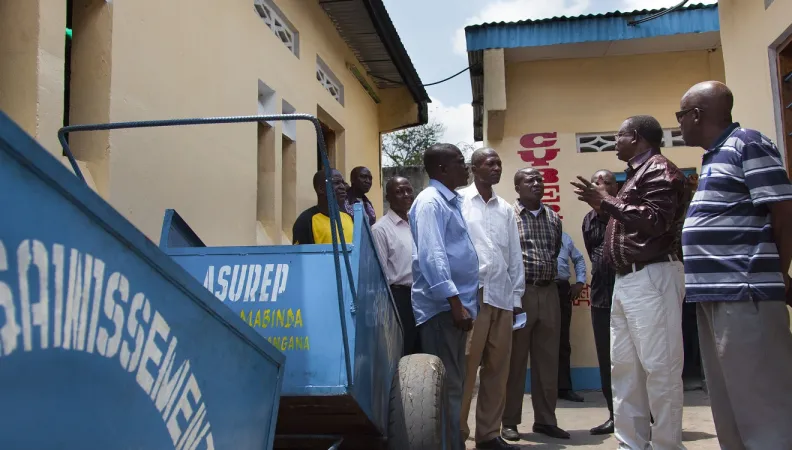Share the page
Jean-Marc Châtaignier: "With Team Europe, We've Entered a New Dimension of Exchange"
Published on

To coincide with the French Presidency of the Council of the European Union, from January 1 to June 30, 2022, AFD Group is publishing an interview each month with an EU specialist in development issues.
This month, we meet with Jean-Marc Châtaigner, Ambassador of the European Union to the Democratic Republic of Congo.
What is your mission as Ambassador of the European Union to the Democratic Republic of Congo?
Jean-Marc Châtaigner: I have a threefold mission, the first being to represent the European Union. Next is political analysis of the local situation, which is useful particularly for Member States without an ambassador in the country. There are 10 Member States with an embassy in the DRC and 17 without. Thirdly, I take care of coordination among Member States, which involves delivering unified messages to the national authorities. For this, I organize joint meetings and promote the image of the European Union as much as possible.
How do AFD Group and the European Union work together on the ground?
J-M C: Until 2020, the development policies of the European Union delegation and of the Member States existed side by side. They each operated in their own way with their own procedures, sometimes meeting together but without any real coordination. The sum of our different development cooperation activities does not equate to working together, and we saw that this creates limits. A real turning point came with the Covid-19 pandemic. We launched the Team Europe concept, so that we could work together from the beginning of projects to create relevant responses to the health crisis, such as providing equipment and vaccines. It was important to project joint energy and a common vision.
This has had significant impact on our views about development action. Our model changed radically when the Team Europe Initiatives were established: we’ve been asked to work together and to identify ideas and topics of shared interest for the new EU general programming for the 2021-2027 period.
There are now 137 Team Europe Initiatives worldwide. Work that we’ve started is now operational in areas such as the environment, along with the Green Alliance. We now have concrete discussions, particularly on who does what actions in the various national parks. AFD Group has also consulted our delegation about its 2022-2026 strategy. We can say that we've entered a new dimension of exchange and of common projections.
How is it affecting the Democratic Republic of Congo?
J-M C: In the DRC, we’ve reached agreement with the Member States active on development issues there to work together on two Team Europe Initiatives: one on the Alliance for Sustainable Development and another on peace and security issues. Five Member States are working on each of these two initiatives: Germany, Belgium, the Netherlands, Sweden, and France. The initiatives have already created real momentum for working together and sharing information.
What are the mutual benefits of this work in common?
J-M C: AFD Group can find real opportunities in this work: it’s not just a cog in the wheel. We’re now exchanging experiences and know-how and not just working one alongside the other. This gives us the chance to obtain greater financing and to exert more influence on certain public policies. These Team Europe Initiatives promote sectoral policy dialogue with the authorities. When we can meet with a government minister as five Member States plus the EU delegation, it’s not the same as meeting him or her alone. It gives us extra clout.
For the European Union, this work in common has several advantages: access to other know-how, new perspectives that aren’t strictly institutional, the ability to make greater strides, and of course the possibility to exert greater influence as a group. We're stronger as a team than we are on our own. And that goes for the EU, too! We’ll be stronger in discussions with our partners if we take a collective approach.
The advantage for the final beneficiaries of these projects is that we now have an approach that considers impact and result: we first discuss together the impact we’re looking for and then talk about the procedures. This new agility in our procedures allows us to channel financing more quickly when there are requests. It also broadens our financial and technical offer, and we can provide better expertise to our partners. Finally, when a project works, we can replicate it much more easily and much faster, by learning from each other’s experiences.
Should we move toward more collaboration of this type?
J-M C: Yes, I’m sure that this type of cooperation on the ground is what we need. Top-down approaches have not worked. It’s thus very advantageous for us to capitalize on our strengths and upgrade our skills.
Nonetheless, that doesn’t mean that we should get rid of our national images. The idea is not to merge everything into a big, nebulous mix. Rather, we should highlight each of our skills. We’re going forward together, and we should continue along these lines.
